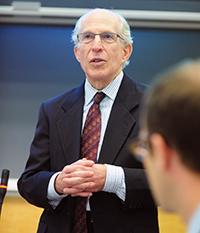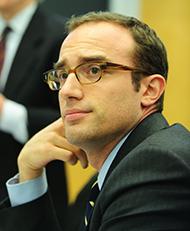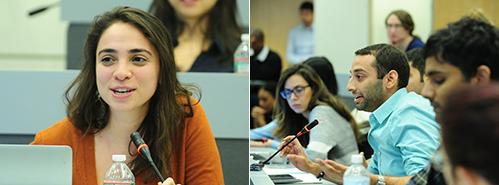Interests and Advocacy in K-12 Education
The Center for Public Research and Leadership Hosts a Candid Conversation on Role of "Special Interests" in Public Education.
New York, December 5, 2014—Competing special interest and advocacy groups play an essential role in the struggle to improve public education in the United States, said experts and advocates at an in-depth Nov. 10 Columbia Law School panel held by the Center for Public Research and Leadership (CPRL).
| Professor James S. Liebman, director of the Center for Public Research and Leadership |
“Amid the policy churn of the last 15 years—charter schools, Common Core, testing, school closures—interest groups have brought to the center conflicting perspectives and introduced new ideas,” said Andres A. Alonso, Professor of Practice at the Harvard Graduate School of Education and former chief executive officer of Baltimore City Public Schools.
Professor James S. Liebman, CPRL’s director, organized the discussion around the evolving role of advocacy and interest groups in American primary and secondary education. Alonso appeared alongside Jeffrey R. Henig, a professor of political science and education at Teachers College; Sydney Morris, co-founder and co-CEO of Educators 4 Excellence; and Kim Sweet, executive director of Advocates for Children of New York. Martin Kurzweil, a lecturer and policy director at Ithaka S+R, introduced the speakers.
Alonso said the education sector is stronger for having a diversity of voices.
“I never saw the work as being about inside and outside, special interest group or not special interest group,” Alonso said. “We all have an interest, and advocates can help you see what you’re missing.”
Professor James S. Liebman, CPRL’s director, organized the discussion around the evolving role of advocacy and interest groups in American primary and secondary education. Alonso appeared alongside Jeffrey R. Henig, a professor of political science and education at Teachers College; Sydney Morris, co-founder and co-CEO of Educators 4 Excellence; and Kim Sweet, executive director of Advocates for Children of New York. Martin Kurzweil, a lecturer and policy director at Ithaka S+R, introduced the speakers.
Alonso said the education sector is stronger for having a diversity of voices.
“I never saw the work as being about inside and outside, special interest group or not special interest group,” Alonso said. “We all have an interest, and advocates can help you see what you’re missing.”
| (l-r) Andres A. Alonso, former chief executive of Baltimore City Public Schools; Sydney Morris, co-founder and co-CEO of Educators 4 Excellence; Kim Sweet, executive director of Advocates for Children of New York; and Jeffrey R. Henig, a professor of political science and education at Teachers College |
Morris and Sweet offered advocates’ perspectives.
“Advocacy is often seen as negative or a little dirty, but it needn’t be,” said Morris. Explaining how the group keeps the broader interests of children front and center, she said, “We provide a bridge between policy creators, policy implementers and beneficiaries. Someone asked recently if we see ourselves as collaborators or agitators; I said we are collaborative agitators or collaborators who agitate.”
| Martin Kurzweil, a lecturer and policy director at Ithaka S+R |
Henig warned that hostility among contending groups could undermine the improvements all want to see.
“The desire to do good is always interwoven with personal and institutional interests,” he said. “Conflict among interests is not destructive to governance and may be essential to it, but there’s an unfortunate sense that there are good guys and bad guys, and compromise is just a step toward permanent defeat.”
CPRL is a partnership between Columbia Law School, Columbia Business School, and Teachers College that provides state and local public school systems with an innovative framework for institutional change. Initially inspired by Liebman’s tenure as chief accountability officer at the New York City Department of Education, the center offers affordable project support, actionable research, and a pipeline of professional graduates to help reform public K-12 education.
“The desire to do good is always interwoven with personal and institutional interests,” he said. “Conflict among interests is not destructive to governance and may be essential to it, but there’s an unfortunate sense that there are good guys and bad guys, and compromise is just a step toward permanent defeat.”
CPRL is a partnership between Columbia Law School, Columbia Business School, and Teachers College that provides state and local public school systems with an innovative framework for institutional change. Initially inspired by Liebman’s tenure as chief accountability officer at the New York City Department of Education, the center offers affordable project support, actionable research, and a pipeline of professional graduates to help reform public K-12 education.
| Students and other attendees join the discussion on the role of special interests in public education. |



